
Green Wave refrigeration equipmentLet’s Think Green together with refrigeration equipment that reduces greenhouse gas emissions for food retailers! Download brochure | ||
Thinking Green is the philosophy of FREOR company. We are exerting efforts to manufacture products with the minimum effect on nature; therefore, we are making significant investments into alternative refrigeration solutions to replace widely used F-gas refrigerants and improve the energy consumption of our products.
Following the idea, all commercial refrigeration equipment manufactured by FREOR can operate on sustainable and energy-efficient refrigerants such as natural propane (R290) gas or CO₂ (R744) refrigerant, qualifying it as environmentally friendly Green Wave refrigeration equipment.

Green Wave R290 – advanced plug-in commercial refrigeration equipment that uses environmentally-friendly propane (R290) gas as the refrigerant. R290 is a natural refrigerant that does not affect the ozone layer, and if emitted to the environment does not represent any harm; furthermore, it has excellent cold transmission properties.
Impact on the environment
Energy consumption
Investment costs
Maintenance and service

Green Wave CO₂ – remote commercial refrigeration equipment adapted to operate on CO₂ (R744) refrigerant in the central refrigeration system. R744 is an environmentally-sustainable refrigerant with no effect on global warming in case of leakage and is suitable for use in refrigeration systems working under mild and cold climate conditions.
Impact on the environment
Energy consumption
Investment costs
Maintenance and service
Fluorinated greenhouse gases (F-gases) are widely used as refrigerants in commercial refrigeration. F-gases are powerful greenhouse gases that trap heat into the atmosphere and contribute to global warming. Hydrofluorocarbons (HFCs) have become the fastest-growing source of greenhouse gas emissions globally.
Responsible institutions across the world are taking actions to cut HFC usage in commercial refrigeration by:

Kigali Amendment to the Montreal Protocol
The Kigali Amendment adds to the Montreal Protocol the phase-down of the production and consumption of HFCs.
Kigali Amendment of October 2016 aims for the phase-down of HFCs by cutting down their production and consumption. These mitigation measures are part of the realization of commitments made under the Paris Agreement. The goal is to achieve over 80 % reduction in HFC consumption by 2047. The impact of the amendment will avoid up to 0.5 °C increase in global temperature by 2100.
Under the amendment, all ratified countries will gradually phase down HFCs and replace them with more environmentally friendly alternatives. A specified group of developed countries, such as the EU, the United States, and Canada, will begin the phase-down in 2019. Several developing countries, including China, Brazil, India, and many African countries, will freeze HFC consumption levels by either 2024 or 2028.
EU F-gas Phasedown Regulation
To control emissions from fluorinated greenhouse gases (F-gases), including hydrofluorocarbons (HFCs), the European Union has adopted the F-gas Regulation.
As one of the most important preventive measures of climate change mitigation is the EU F-gas Regulation No 517 /2014. It aims to limit the consumption of HFCs by 79% by 2030 in the EU countries.
From January 1st, 2020, using HFCs with a GWP (global warming potential) of 2500 and over to service or maintain refrigeration equipment with a charge size of 40 tonnes of CO₂ equivalent or above as well as placing new equipment on the market that contains HFCs with GWP of 2,500 or more was prohibited. Only recycled refrigerants with a GWP of 2,500 or more are allowed for servicing until 2030. In many countries, the ban on HFCs exceeding the ceiling GWP values in repairs and maintenance would mean that 95–100% of refrigeration equipment used in the shops has to be replaced with alternatives or adapted for using a different refrigerant.
In the second stage, which started on January 1st, 2022, placing new refrigeration equipment on the market and multipack centralized refrigeration systems for commercial use with a rated capacity of 40KW or more that contains HFCs with a GWP of 150 were prohibited. The primary refrigerant circuit of cascade systems with fluorinated greenhouse gases with a GWP of less than 1500 may be used as an exception.
In the third stage, which will start in 2030, recycled and reclaimed HFCs with a GWP > 2,500 used for service or maintenance purposes will be prohibited.
In the light of legislation affecting the market, FREOR recommends that your company would consider the transition to a low GWP replacement refrigerant.
FREOR was among the first in the world to develop propane (R290) refrigeration technology for the use in large commercial refrigeration equipment in 2015, which complies with the safety standards EN 378 and IEC 60335-2-89. The latter now enables to increase of R290 refrigerant charge limit from 150-gram to maximum 500-gram of gas per closed cycle.
FREOR Green Wave R290 technology and CO₂ operated refrigeration equipment is an ecologically safe future-proof solution. Natural refrigerants are not subject to any legislative requirements under the global HFC phase-down, including the Kigali Amendment to the Montreal Protocol and the EU F-Gas Regulation.
FREOR – your solution partner in the challenge of climate change!
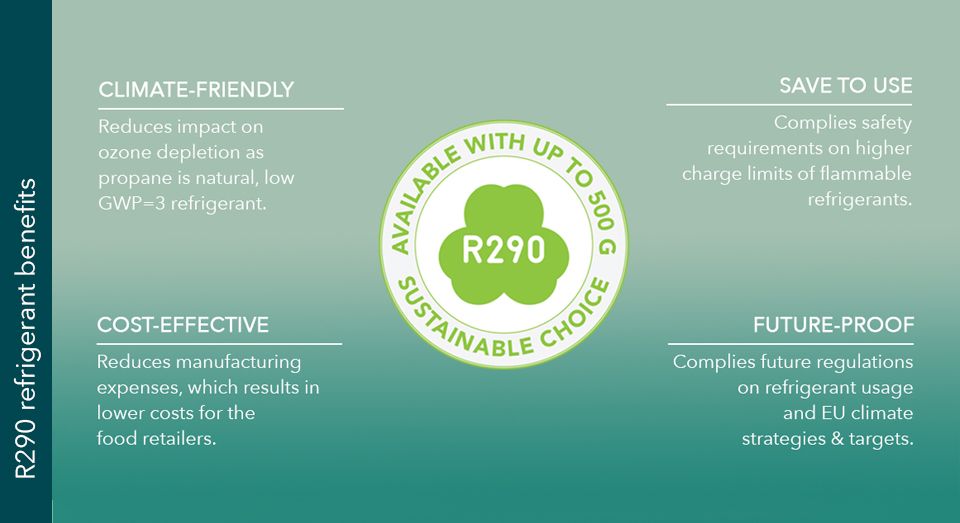
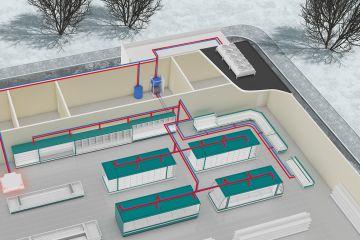
It is a cost-effective solution for shops, which allows connecting the plug-in refrigeration equipment to liquid-cooled system, in which excess condensation heat is removed through liquid pipes to the exterior of a building.
More
At FREOR we design customized hydro-aggregates for coldrooms that are fitted with compressors and plate heat exchangers. The units are intended to maintain the temperatures of products stored in coldrooms.
More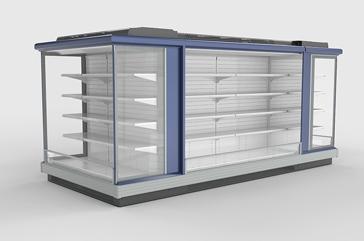
Plug-in refrigeration equipment has all the components involved in the refrigeration cycle and is fitted with effective hermetic compressors excellently operating in various temperatures.
More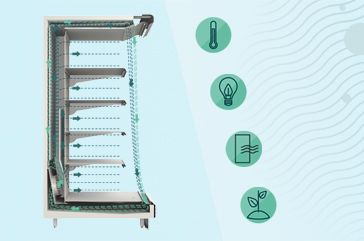
FREOR‘s dual air curtain is a unique airflow management system, designed for open and closed multidecks to ensure customers comfort and deliver energy savings.
More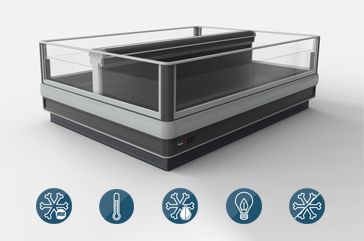
With the intention to decrease overheating of the frozen food area of the low-temperature refrigeration display cases, and to improve the safety of stored food products, FREOR has designed a unique Gravity Defrost System.
More
FREOR cares about its customers’ privacy and makes sure that their personal data is safe:
FREOR collects the following information:
FREOR seeks to keep the FREOR website as simple to use as possible and the relevant information more easily accessible. In order to find out what information is most relevant to the visitors of the website, FREOR collects demographic and statistical data. This information does not identify a specific person but provides statistical information that FREOR can analyse and then apply for improving the functionality of the website or use the data for marketing purposes.
FREOR collects this information using the Google Analytics tool that generates statistical and other website usage information. The information is stored by Google Inc. (USA company). Google EU-USA privacy policy is available here.
You can disable the feature of data collection on Google Analytics at any time as described here.
FREOR seeks to share with its newsletter recipients only the relevant news. If you subscribe to the FREOR newsletter on the FREOR website or otherwise provide FREOR with your contact data (by exchanging visit cards with FREOR representatives at meetings or events or presenting your contact information when registering for FREOR events), FREOR may send you newsletters and notifications with the interest of pursuing business relationships with companies represented by you.
Having sent a notification, FREOR may collect statistical data about your behaviour with regard to the newsletter, for instance, whether you have opened the e-mail, what links you clicked on, what device you used, etc. FREOR does this by using cookies (provided that you give consent). In order to improve the communication, FREOR monitors communication efficiency statistics.
If you do not find the news relevant, you can cancel them at any time. You can cancel your consent for FREOR to collect and process personal data provided by you at any time by sending an e-mail to marketing@freor.com or replying by clicking on the link at the end of the newsletter. Server recordings
The server hosting the FREOR website may also record enquiries that you submit to the server (address of the website that you are opening, device and browser that you use, your IP address and login time). This data is used for technical purposes only in order to ensure proper and safe functioning of the website.
| Name | Source | Purpose | Category | Term |
| PHPSESSID | freor.com | Saves visitor’s session status through different page requests. | Necessary for a site to function | Session |
| _icl_current_language | freor.com | Saves visitor`s choice of language. | Page settings | Session |
| _ceg.s | crazyegg.com | Crazy Egg service cookie registers visitor clicks in the website. | Statistics | 3 months |
| _ceg.u | crazyegg.com | Crazy Egg Cookie, which helps you recognize a visitor who has already visited your site. | Statistics | 3 months |
| _gat, _gid, _ga | Google Analytics | Google Analytics cookies record a unique ID that is used to generate statistics for site views. | Statistics | Session |
| collect | Google Analytics | Sends information to Google Analytics about the visitor’s device and behavior. Helps identify same visitor using different devices. | Marketing | Session |
| NID | .gstatic.com | Google ads cookie | Marketing | 2 years |
| GMAIL_RTT | google.com | Allows sharing content on the Google+ social network. | Page settings | Session |
| S, SIDCC | google.com | Security cookie that helps to protect Google user data. | Security | 2 months |
| wordpress_logged_in_ | freor.com | WordPress TVS cookie that recognizes user logged to website. | Necessary for a site to function | Session
|
| wordpress_sec | freor.com | WordPress TVS cookie, user account security ID. Is used to ensure account security. | Necessary for a site to function | Session
|
| wordpress_test_cookie | freor.com | The WordPress TVS cookie used to check if the browser supports cookie registration. | Necessary for a site to function | Session
|
| wp-settings-1 | freor.com | WordPress TVS cookie, logged user ID. Is used to display the admin bar. | Necessary for a site to function | 1 year |
| wp-settings-time-1 | freor.com | WordPress TVS cookie used to store logon time. | Necessary for a site to function | 1 year |
One the pieces of statistical information crucial to FREOR is the return visitor rate. FREOR uses this data to analyse visitor behaviour and to enhance the experience of visiting the site. To track repeated visits, the FREOR website uses cookies. The cookies are installed and used with a help of the Google Analytics tool.
Cookies are installed on your device only upon your consent, except for cookies that are required solely for ensuring technical functioning of the website. It should be noted that if you do not grant the website the right to use cookies, some of the website’s features may partially not operate.
You can delete or manage cookies at any time; besides, most browsers allow you to disable installation of cookies. However, if you do that, some of the services and features may not work. More information is available here.
Statistical data about visitors to the FREOR website may be accessed by the FREOR employees working in marketing and commercial divisions that are responsible for data analysis and development of the website. Access to technical records may also be granted to FREOR partners that provide website content management tools or hosting services of the FREOR website. We responsibly protect the collected data about the visitors of the website from loss or unauthorised use.
FREOR uses the collected data for analysis for up to three years.